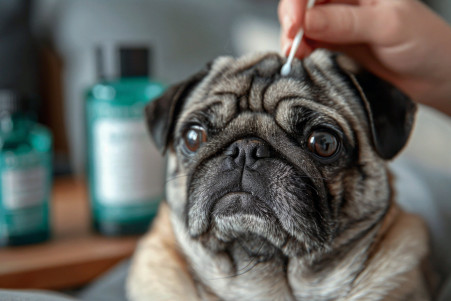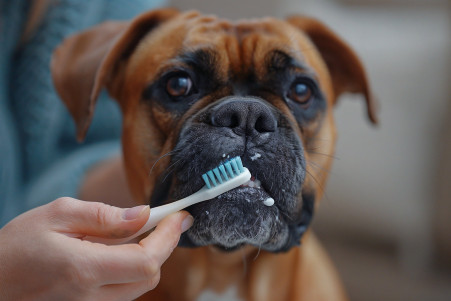Can You Use Hydrogen Peroxide on Dogs? A Vet Weighs In
18 April 2024 • Updated 18 April 2024

The use of hydrogen peroxide as a disinfectant and antiseptic is well-known, but its safety when it comes to dogs is a subject that needs to be approached with caution, especially when it comes to potential dangers and the right way to use it. Hydrogen peroxide is safe for dogs in small amounts and when used correctly, such as when it’s used to induce vomiting after a dog has ingested a toxin. However, large amounts can lead to serious stomach upset, gastrointestinal problems, and in some cases, respiratory issues, so it’s important to make sure that it’s only used under the direction of a vet.
To help you better understand when and how to use hydrogen peroxide on dogs safely and effectively, we’ve turned to veterinary research and reputable organizations. By doing so, we can learn more about how hydrogen peroxide affects a dog’s system, including how much is safe to use, what the potential side effects are, and when it’s okay to use it. In each case, we’ll stress the importance of working with a vet to make sure that any treatment is safe for our furry friends.
Is hydrogen peroxide safe for dogs?
Hydrogen Peroxide and Dog Vomiting: When to Use It and How
Hydrogen peroxide is one of the most common substances that veterinarians recommend for dog owners to use to induce vomiting in cases of poisoning. However, as noted by the Animal Poison Control, it's important to consult with a professional before using hydrogen peroxide to induce vomiting because it can be contraindicated and potentially harmful in some situations.
The recommended dose is typically 1 teaspoon per 5 lbs of body weight, with a maximum dose of 3 tablespoons, according to the American Kennel Club. It should not be used if the dog is already exhibiting clinical signs of poisoning, such as lethargy, unconsciousness, or seizures, because it may not be effective and could make the situation worse. Vomiting should occur within 10-15 minutes of administration, and the entire process can take up to 45 minutes.
As noted in a VETgirl blog post that references a study published in the Journal of the American Veterinary Medical Association (JAVMA) in 2017, the use of sucralfate and antacids (e.g., proton-pump inhibitors or H2 blockers) after the administration of hydrogen peroxide can help reduce the potential gastrointestinal irritation that can be caused by the hydrogen peroxide. Although hydrogen peroxide is an effective emetic when used properly, Volhard Dog Nutrition explains that it works by irritating the oropharynx and gastric lining to induce a gag reflex.
While hydrogen peroxide can be an effective way to induce vomiting in some poisoning cases, it's important to use it carefully and only under the guidance of a veterinarian to avoid potential side effects. Proper wound care is another area where safer alternatives may be preferable.
How to Clean a Dog Wound Without Hydrogen Peroxide
Hydrogen peroxide is not recommended for cleaning dog wounds, as it can damage healthy tissue and delay healing, according to Kingsdale Animal Hospital. The cytotoxic effects of hydrogen peroxide can slow down the wound-healing process by damaging fibroblasts, the cells required for wound healing.
Instead, Drugs.com suggests using a saline solution or warm water, which are less harsh and more efficient for flushing and cleaning wounds. Veterinary-approved antiseptic solutions, such as diluted betadine or chlorhexidine, can also be used to disinfect wounds.
If you prefer a more holistic approach, Whole Dog Journal notes that aloe vera gel, coconut oil, and diluted apple cider vinegar are all antimicrobial and less harsh on the skin. These natural remedies can be used to clean and help heal dog wounds.
No matter which route you choose, Newtown Vets stresses the importance of consulting a vet for the proper care of wounds, especially if they are deep or serious. If not treated correctly, wounds can lead to complications, so it's important to make sure you're following a vet's advice to keep your dog safe and healthy.
Hydrogen Peroxide Poisoning in Dogs: Signs, Symptoms, and First Aid
Hydrogen peroxide poisoning can occur in dogs if they consume large amounts of the substance, and it can be fatal if not treated. The Pet Poison Helpline notes that symptoms of hydrogen peroxide poisoning can include vomiting, diarrhea, abdominal pain, lethargy, and breathing difficulties.
If a dog has ingested hydrogen peroxide, it's important to contact a veterinarian or pet poison control center immediately for professional help. PetMD suggests calling the Pet Poison Helpline at (855) 764-7661 or the ASPCA Animal Poison Control Center at (888) 426-4435 for assistance.
Initial treatment may involve inducing vomiting (if advised by a professional), supportive care, and monitoring for signs of gastrointestinal and respiratory issues. That said, as explained by PetHelpful, hydrogen peroxide should not be used if the dog has already vomited, is having trouble breathing, is unconscious, or is having seizures.
Seeking immediate veterinary care is important because hydrogen peroxide poisoning can lead to serious issues if not treated right away. Vets may use medications to induce vomiting more safely, including apomorphine or Clevor, which are mentioned by PetMD.
Although hydrogen peroxide can be helpful if used properly, it's important to use it with caution and to consult a professional to ensure it's safe for your dog. For other pet health concerns, it may be helpful to look into safer options, such as natural remedies.
Homeopathic and Holistic Remedies for Dog Health
Homeopathic treatments can be effective for mild diarrhea and skin problems. PetMD explains that a bland diet of boiled chicken, turkey, or beef and rice is often recommended for mild diarrhea or mucus in stool. Oatmeal-based, fragrance-free shampoos can soothe itchy, irritated, dry skin, and adding omega-3 fatty acids via supplements can also help.
Holistic antimicrobial and anti-inflammatory agents can be used in place of conventional antibiotics for certain issues. Dogs Naturally Magazine lists a number of options, including oil of oregano, manuka honey, and turmeric, all of which have been found to have antibacterial, antiviral, and antifungal properties.
Homemade cleaning products that include ingredients like vinegar, baking soda, and lemon juice can be used to clean and disinfect surfaces and remove stains and odors, according to the American Kennel Club. These natural options can be less toxic for pets than chemical-based products.
For minor problems like paw licking and allergies, homeopathic treatments like Epsom salt soaks and antihistamines can be used, according to PetMD. However, it's important to talk to a vet before using any homeopathic treatments and to make sure to use the correct dosages and application instructions to keep your dog safe and healthy.
Conclusion: Use With Caution and Veterinary Supervision
While hydrogen peroxide can be used in certain situations with the help of a vet, it is not without risks and should be used with care. Ingesting large amounts of hydrogen peroxide can be dangerous for dogs and lead to serious gastrointestinal and respiratory problems.
For wound care and general cleaning, there are other alternatives that are safer and more effective, including saline solution, natural remedies, and mild cleaning products. If you have any questions or concerns, it’s always best to talk to your vet about the best way to treat your dog, as they will be able to offer expert advice that is tailored to your dog’s needs.
Always make sure that you are putting your dog’s safety and health first when considering using any substance or treatment.


